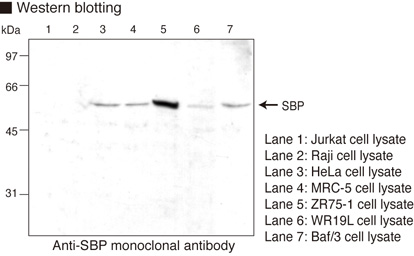Anti-Selenium Binding Protein (Human) mAb
| Code | Size | Price |
|---|
| MBL-M061-3 | 100 ug | £323.00 |
Quantity:
Prices exclude any Taxes / VAT
Overview
Host Type: Mouse
Antibody Isotype: IgG1
Antibody Clonality: Monoclonal
Antibody Clone: 4D4
Regulatory Status: RUO
Target Species:
- Human
- Mouse
- Rat
Applications:
- Immunohistochemistry (IHC)
- Western Blot (WB)
Shipping:
4°C
Storage:
-20°C
Images
Documents
Further Information
Applications:
WB - 1 ug/mL (chemiluminescence detection system) IHC - 2 ug/mL
Background:
Selenium is an essential trace element that has been recognized to have a capacity for conferring tolerance to the toxic manifestation of various heavy metal exposures (for example, cadmium, mercury, lead and arsenic etc.) and chemical substances including radicals. Dietary selenium supplementation within the range of normal dietary intake can significantly decrease the incidence and mortality of several cancers. Moreover, it is reported deficiency of it may cause certain neurological diseases including schizophrenia. These effects of selenium are thought to be emerged by the proteins that accept the selenium and the presence of such proteins has been documented in numerous organs. These proteins are comprised of selenoproteins that accept the selenium as selenocystein and proteins that bind selenium ion(s) after synthesis. Mouse 56 kDa selenium binding protein (mouse SBP, mSP56) is found as one of such proteins that bind selenium after its synthesis. It is a cytosolic protein whose physiological property is largely unknown. Mouse SBP is extremely homologous to another 56 kDa mouse protein named acetaminophen binding protein (mouse AcBP) which binds the metabolite of acetaminophen concerning serious liver injury, suggesting that both 56 kDa proteins may be involved in detoxification processes. Human 56 kDa selenium binding protein (human SBP) is a protein that has higher homology to 56 kDa mouse SBP rather than to mouse AcBP. Human SBP is expressed in liver, lung and kidney at high level and in heart and intestine at lower level.
Concentration:
1 mg/mL
Formulation:
100 ug IgG in 100 ul volume of PBS containing 50% glycerol, pH 7.2. No preservative iscontained.
Gene IDs:
Human: 8991 Mouse: 20341 Rat: 140927
Immunogen Translated:
Recombinant human full-length SBP
Reactivity:
This antibody reacts with Selenium
Binding Protein (SBP) on Western blotting.
Shelf Life:
1 year
Source:
This antibody was purified from hybridoma
(clone 4D4) supernatant using protein A agarose. This
hybridoma was established by fusion of mouse myeloma
cell SP2/0 with Balb/c mouse splenocyte immunized with
the recombinant full-length human SBP.
Target:
Selenium Binding
References
1) Glatt, S. J., et al., PNAS 102, 15533-15538 (2005)
2) Chang, P. M., et al., J.Cell Biochem. 64, 217-224 (1997)
3) Lanfear, J., et al., Carciogenesis 14, 335-341 (1993)
4) Pumford, N. R., et al., Biochem. Biophys Res. Commun.
182, 1348-1355 (1992)
5) Bansal, M. P., et al., Carcinogenesis 11, 2071-2073 (1990)
6) Bansal, M. P., et al., Carcinogenesis 10, 541-546 (1989)
Clone 4D4 is used in reference number 1).




